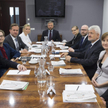The current term of office of the European institutions is coming to an end. Being in a similar period five years ago, we had a proposal of the previous European Commission (EC) concerning the closed-loop economy on the table, which, however, for the most part, focused on waste.
From today’s perspective, we already know that this is only one element of the life cycle. And appropriate actions should also be undertaken in the remaining scope (i.e. in relation to the acquisition of raw materials, the design process as well as production, distribution and consumption).
Broader perspective
That is why, in 2015, the new EC presented a package related to circular economy, consisting of draft waste directives and an action plan entitled „Closing the cycle …”. In the latter, EC announced several dozen initiatives which it intended to implement in the following years. From today’s perspective and after the experience of working on individual projects from this list, we are certain that circular economy should be implemented not only at all stages of the life cycle, but also in cooperation, which will lead to the creation of beneficial and feasible solutions, including those taking into account our national realities and the specificity of the Polish economy.
Already in the middle of 2016. Poland, together with other EU Member States, agreed to continue working on the EC’s proposals regarding circular economy. We understood that this is the right direction and, to put it shortly, that we should focus on improving the raw material efficiency of our economy and strive for a better waste management. This does not mean, however, that we saw only the benefits of individual proposals, examples of which are set out below.
The provisions of the Fertiliser Regulation, which is intended to increase the use of products from the processing of plant and animal waste for fertilisation, are still to be determined. The planned regulations – through restrictive provisions on pollution – may adversely affect Polish fertiliser manufacturers that play an important role in the domestic chemical industry.
























